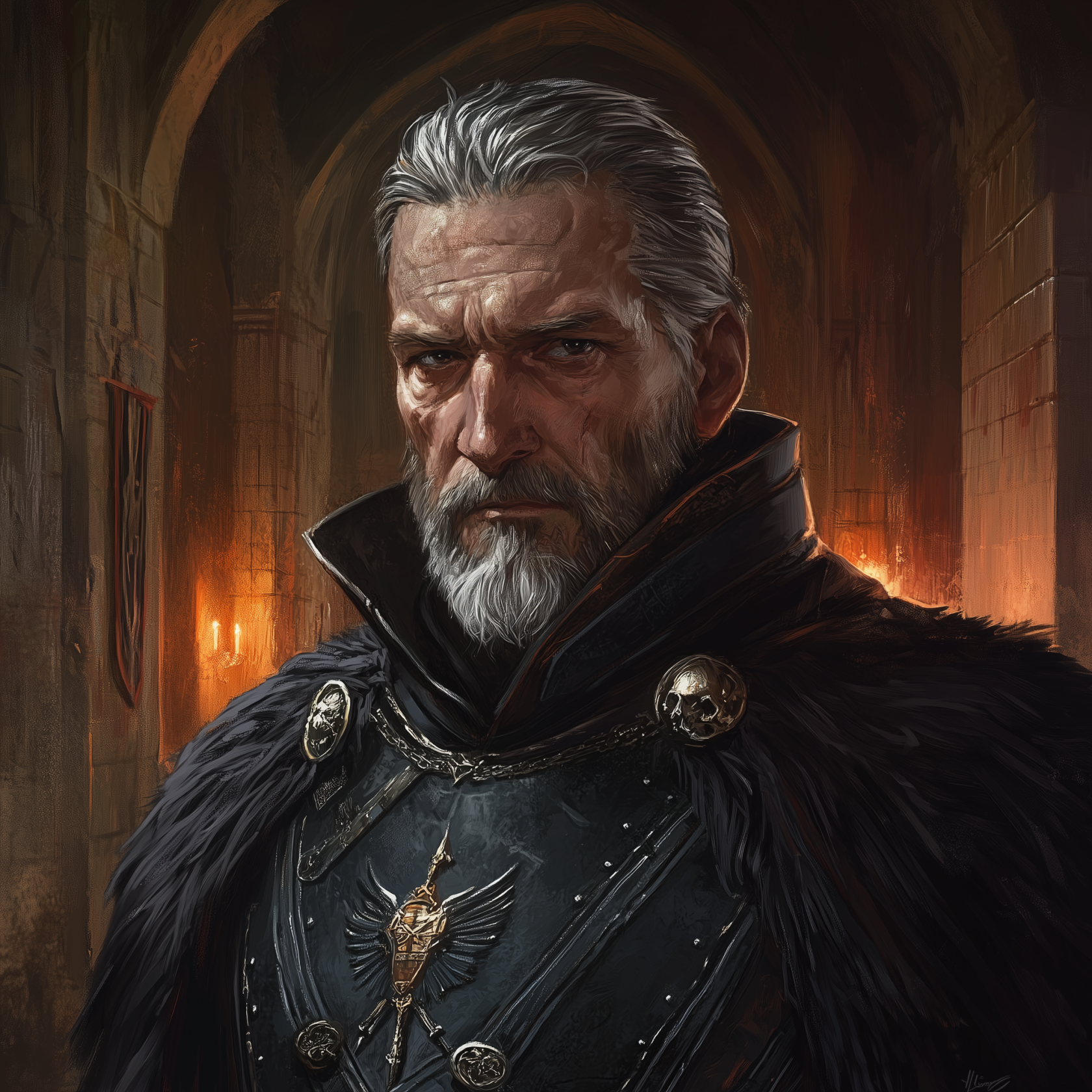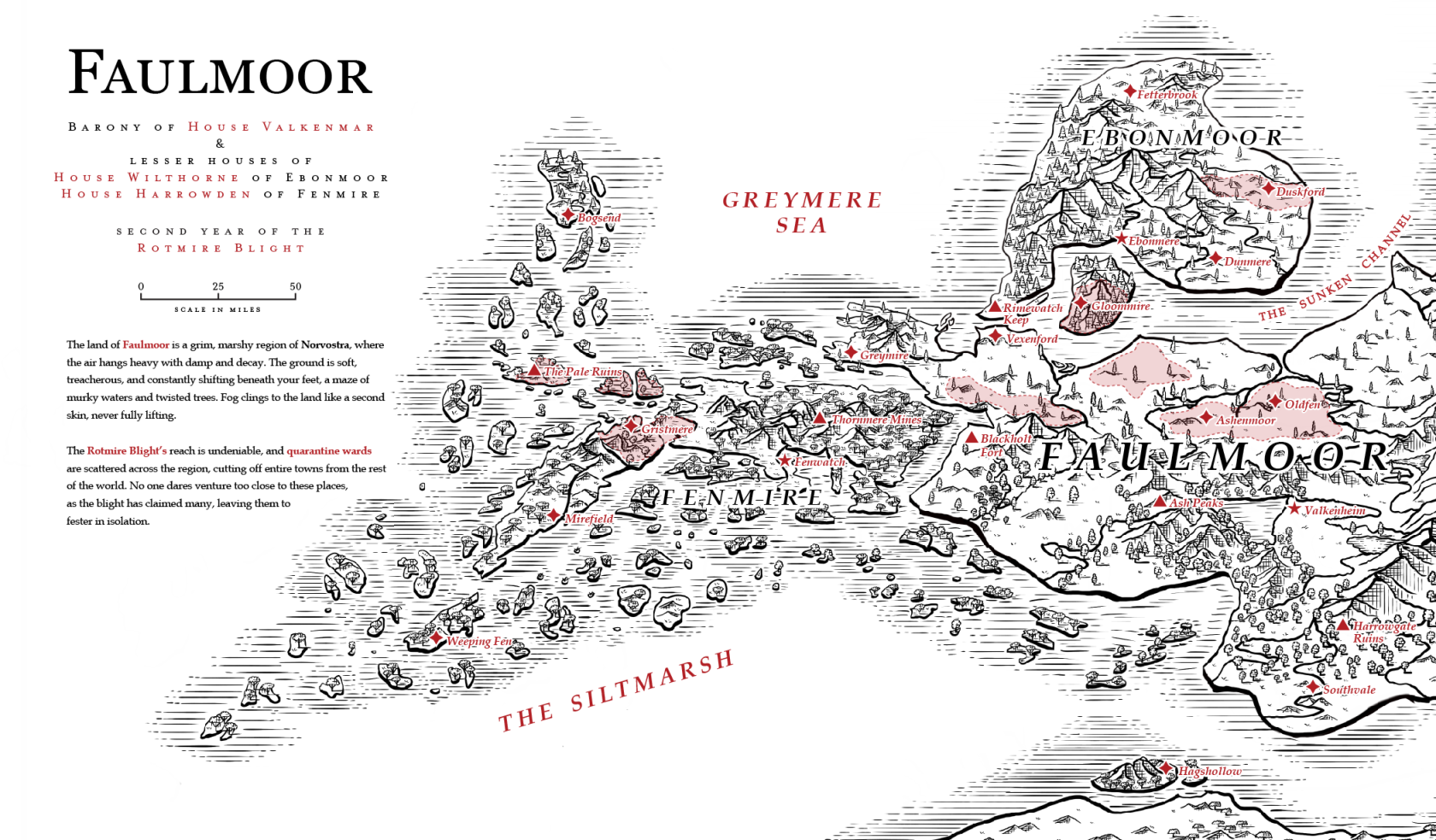House Valkenmar of Faulmoor
"Steel and Sacrifice."
House Valkenmar, once a powerful and prosperous noble house, stands as a shadow of its former self in the wake of the Rotmire Blight. Their capital, Valkenheim, a sprawling city nestled at the heart of Faulmoor, was once a symbol of strength, wealth, and cultural prominence. Valkenheim’s imposing fortifications, its gleaming stone towers, and its rich history of trade and diplomacy were evidence of House Valkenmar’s former supremacy. The city, strategically located along major trade routes, flourished under the rule of Baron Malric Valkenmar, whose keen political mind and steadfast leadership turned his house into one of the region’s most influential.
However, the Rotmire Blight has shattered much of House Valkenmar’s former glory. As the plague spread, so too did fear and isolation, and Valkenheim has become a city marked by quarantine walls, empty streets, and a ruling family desperately clinging to control. The once-thriving trade routes are now barely maintained, and the city's grand halls have fallen silent, echoing only with the hushed steps of those working to maintain an appearance of order. Under the Baron’s rule, Valkenheim has become more fortress than capital, a place defined by fear and secrecy rather than grandeur.
The Baron’s fixation on protecting his son and his desperate search for a cure have left House Valkenmar vulnerable, and its relationships with its vassals have grown increasingly strained.
Vassals and Political Strife
House Valkenmar traditionally ruled through a delicate balance of power with two key vassals: House Wilthorne of Ebonmoor and House Harrowden of Fenmire. Both houses have long served House Valkenmar, but the bonds of loyalty have become increasingly strained in the wake of the Rotmire Blight and the Baron's weakening rule.
House Wilthorne, hailing from the swampy and foreboding marshlands of Ebonmoor, has always prided itself on its military prowess. The Wilthornes were once an invaluable military asset to House Valkenmar, offering their expert knowledge of spycraft and diplomacy. However, with the Rotmire Blight ravaging the region, the Wilthornes have grown impatient with Malric’s growing isolation and his increasing reliance on secrecy. Lord Eadric Wilthorne, the head of House Wilthorne, has begun seeking ways to increase his house’s power and secure more control over trade routes and resources, eyeing the weakened state of Valkenmar as an opportunity for greater autonomy.
House Harrowden, on the other hand, has never enjoyed the same level of respect from House Valkenmar. The relationship has always been one of pragmatism—House Valkenmar’s rule over the marsh people of Fenmire has been one of dominance and control, rather than mutual respect. The Harrowdens, though a less than wealthy house, were largely valued for their ability to maintain order in the otherwise unruly and volatile region of Fenmire. The marshlands, home to a hardy and rebellious people, were a challenge to keep under Valkenmar’s control, and House Harrowden served as a necessary tool to subjugate the Fenmire populace.
A Fractured House
At the center of this web of growing mistrust and political maneuvering is Baron Malric Valkenmar, whose once steady hand has faltered. The Baron is consumed by grief, loss, and a desperate need to protect his son, Lukas, who is seen by many as the last hope for the future of House Valkenmar. Malric’s rule, once defined by pragmatism and control, is now a reign of secrecy and desperation. His fixation on the search for a cure for the Rotmire Blight—and his increasingly bizarre and secretive methods—have made him a distant and isolated figure, even from his own vassals.
As the Baron retreats further into his own world, House Valkenmar’s leadership has become fractured. Lord Ivor Valkenmar, Malric’s younger brother, has taken on a more prominent role in the day-to-day management of the house’s affairs, including overseeing the house’s economic operations and smuggling networks. However, Ivor’s involvement is shrouded in secrecy, and his dealings are often viewed with suspicion by the vassals, who are unsure whether he can be trusted or if he is plotting his own rise to power.
In the current state of affairs, House Valkenmar stands at a crossroads—caught between the weight of its past glory and the pressure of its present despair. The growing tensions with its vassals, the Baron’s obsession with the death of his family, and the uncertainty of the Rotmire Blight’s future all contribute to a fragile political landscape where the survival of the house itself is in question.
A Biography of Loss and Desperation
Baron Malric Valkenmar (52 years)
 Before the Blight, Malric Valkenmar was widely regarded as one of the most formidable rulers in Faulmoor. Known for his commanding presence and sharp mind, he was a strategic leader, able to navigate the intricacies of politics and military affairs with remarkable precision. Under his rule, House Valkenmar flourished, enjoying both prosperity and respect. His decisive hand ensured the house’s wealth and influence grew rapidly, making them one of the wealthiest and most powerful families in Faulmoor.
Before the Blight, Malric Valkenmar was widely regarded as one of the most formidable rulers in Faulmoor. Known for his commanding presence and sharp mind, he was a strategic leader, able to navigate the intricacies of politics and military affairs with remarkable precision. Under his rule, House Valkenmar flourished, enjoying both prosperity and respect. His decisive hand ensured the house’s wealth and influence grew rapidly, making them one of the wealthiest and most powerful families in Faulmoor.
Malric’s leadership style was defined by a balance of strength and diplomacy—he was not an arbitrary tyrant, but a calculated ruler who understood the need for stability and fairness. His people loved him for his ability to blend authority with compassion, a rare trait that endeared him even to his common folk.
However, when the Blight began to ravage the land, Malric’s world shattered. The loss of his wife and daughter left him emotionally broken. As the disease spread, his decisions grew increasingly focused on protecting his surviving son—the last thread of his lineage. The Baron’s once-dominant persona now exists as a reclusive figure, unable to come to terms with the devastation wrought by the Blight. His rule has become one of increasing isolation—both from his people and, tragically, from his son.
His leadership, once marked by pragmatism and care for his people, has become an obsessive search for a cure—a desperate attempt to reverse the irreversible loss of his family. His attempts to preserve the memory of those he lost have taken forms that remain mostly hidden from the public eye, their true nature obscured by a veil of secrecy. It is said that the Baron, in his relentless search for answers, has become consumed by methods that are as mysterious as they are controversial. Whispers suggest that his family’s loss has led him to pursue any means, however questionable, in his attempts to restore what was lost.
Despite his grief, Baron Malric has not abandoned his role as House Valkenmar’s patriarch. Yet his rule has become a shadow of its former self, dominated by a cold, distant presence. His inability to acknowledge the loss of control is reflected in his refusal to relinquish power or responsibility, even as the house teeters on the brink of collapse. It is in this fragile, fractured state that Malric finds himself, clinging to his last hopes for both his son and the restoration of what he has lost.
Lord Ivor Valkenmar (43 years)
 Where his elder brother is consumed by grief and fear, Lord Ivor Valkenmar remains focused on the pragmatic survival of House Valkenmar. Ivor, younger and far more coldly rational, never shared Malric’s passion for leadership but always understood its necessity. As the younger sibling, he was often the quieter presence in the house’s affairs, allowing Malric to assume the mantle of leadership while Ivor worked behind the scenes to manage their economic interests.
Where his elder brother is consumed by grief and fear, Lord Ivor Valkenmar remains focused on the pragmatic survival of House Valkenmar. Ivor, younger and far more coldly rational, never shared Malric’s passion for leadership but always understood its necessity. As the younger sibling, he was often the quieter presence in the house’s affairs, allowing Malric to assume the mantle of leadership while Ivor worked behind the scenes to manage their economic interests.
Before the Blight, Lord Ivor had a reputation for being a shrewd administrator. He was seen as pragmatic, more inclined to strike alliances and seek profitable ventures than indulge in grand gestures or political machinations. His leadership was defined by his ability to keep the wheels of House Valkenmar’s economic machine turning smoothly. While his brother dealt with the broader political struggles, Ivor ensured that the house maintained its wealth, power, and resources. His was a leadership marked not by charisma, but by efficiency.
With the outbreak of the Blight, Ivor quickly assumed a more active role, aware that the survival of the house depended on securing resources—not only in terms of wealth but also in terms of medical supplies and smuggled goods. Ivor has become the mastermind behind the house’s smuggling operations, his quiet but calculated decisions ensuring that trade routes remain open and that vital supplies continue to flow into Valkenmar’s strongholds. His efforts have made him a critical figure in the house’s ongoing attempts to navigate the crisis.
While he does not share his brother’s obsession with the loss of his family, Ivor understands the need to placate Malric and maintain the family’s honor. His dealings are often in the shadows, focusing on the economic future of House Valkenmar as its ruler grows increasingly irrational. Despite his growing influence, Ivor’s role remains in the background—his efforts often overshadowed by his brother’s more theatrical attempts at securing a cure.
Lady Freya Valkenmar (38 years at time of death)
The tragic death of Lady Freya has left an indelible mark on House Valkenmar. Before her untimely demise, Lady Freya was known not only for her beauty but also for her intelligence and kindness. She was a woman of great compassion, often overseeing the welfare of the common folk, ensuring that House Valkenmar’s wealth was used not just to strengthen their position but also to care for their people. Freya was involved in the social and diplomatic circles of Faulmoor, admired for her wisdom and her ability to soothe tensions between factions.
Lady Astrid Valkenmar (16 years at time of death)
Lady Astrid, the youngest of the Valkenmar children, was a bright and promising young woman whose life was tragically cut short by the Blight. Though not yet fully into adulthood, Astrid exhibited signs of being a compassionate and thoughtful leader, much like her late mother. She had already begun to show interest in the welfare of the region and was an advocate for better treatment of the sick and impoverished. Her premature death has added another layer of heartbreak to House Valkenmar’s saga.
Lukas Valkenmar (10 years)
The son of Malric and the last surviving member of the Valkenmar line, Lukas is a child trapped in a world of grief, fear, and control. Raised in isolation and subjected to the barrier of his father’s paranoia, Lukas is a boy who has learned to watch rather than participate. Though his father keeps him hidden from the horrors of the outside world, Lukas has begun to notice the subtle shifts in the house’s operations. His relationship with his father is one of growing distance and fear, as Malric’s obsessive desire to protect him has created an environment of constant tension. Lukas understands, perhaps better than anyone, that his father is no longer the man he once was.
The future of House Valkenmar lies in the hands of this boy—though his fate remains uncertain.

